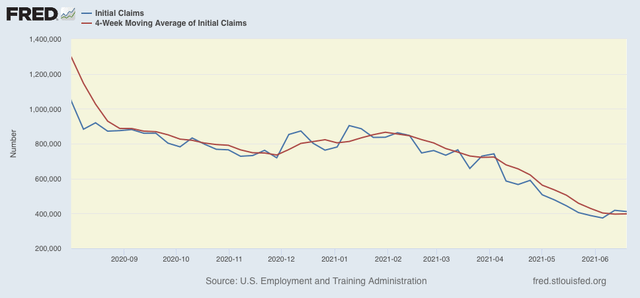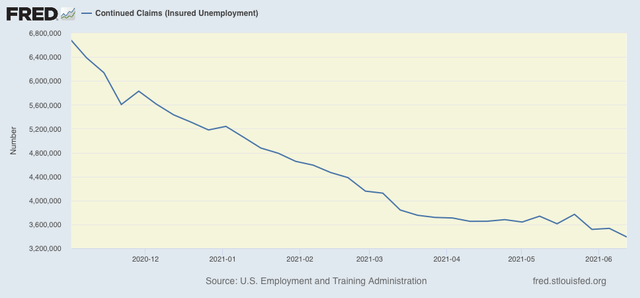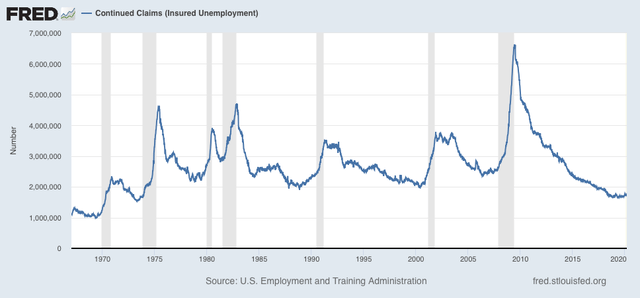New jobless claims stall, adding to the evidence that stalling vaccinations and case counts are having an economic effect New jobless claims have been the most important weekly economic datapoint this year, as they have correlated strongly with vaccination progress. Unfortunately, that progress has largely stalled in the past month, and now new jobless claims appear to have stalled as well. This week new jobless claims declined 7,000 to 411,000, 37,000 higher than the pandemic low of 374,000 set two weeks ago. The 4 week average of claims also rose by 1,500 above last week’s pandemic low to 397,750.At the peak of the pandemic lockdowns, new claims were running 6 million to 7 million per week. Here is the trend since the beginning of last
Topics:
NewDealdemocrat considers the following as important: new jobless claims, US EConomics
This could be interesting, too:
NewDealdemocrat writes JOLTS revisions from Yesterday’s Report
Bill Haskell writes The North American Automobile Industry Waits for Trump and the Gov. to Act
Bill Haskell writes Families Struggle Paying for Child Care While Working
Joel Eissenberg writes Time for Senate Dems to stand up against Trump/Musk
New jobless claims stall, adding to the evidence that stalling vaccinations and case counts are having an economic effect
New jobless claims have been the most important weekly economic datapoint this year, as they have correlated strongly with vaccination progress. Unfortunately, that progress has largely stalled in the past month, and now new jobless claims appear to have stalled as well.
This week new jobless claims declined 7,000 to 411,000, 37,000 higher than the pandemic low of 374,000 set two weeks ago. The 4 week average of claims also rose by 1,500 above last week’s pandemic low to 397,750.
At the peak of the pandemic lockdowns, new claims were running 6 million to 7 million per week. Here is the trend since the beginning of last August:

From late February into May, claims had trended down an average of roughly 100,000 per month. This had slowed to roughly 50,000 per month, indicating that the “opening” of the economy is getting nearer to an endpoint. As indicated above, since 5 weeks ago, the trend is now sideways. This also implies a sharp slowing down of net job creation from the last 3 months’ levels.
The story is different for continuing claims, which are reported with a one-week lag, and lag the trend of initial claims typically by a few weeks to several months. These set a new pandemic low, falling 144,000 to 3,390,000. At the same time, over the past 3 months these have only declined about 10% from roughly 3,750,000:

At least some of this decline *may* be due to many States’ termination of all extended jobless benefits due to the pandemic.
A long term perspective shows that these are equivalent to the worst levels of most previous recessions, or early in the expansions, versus at 2,000,000 or below later in strong expansions:

As I wrote two weeks ago and reiterated last week, “I think we are going to see two tracks going forward from here, as near-normalcy does return to the more vaccinated parts of the country, while attempts to return to normalcy fail in the laggard regions.”
Last week I further wrote, “Over the next 6 to 8 weeks, these States [in the South and the mountain West with low vaccination rates] are ripe for a serious outbreak of the highly infectious new ‘delta’ variant of the disease,” which in turn is going to lead to many people “re-cocooning” themselves in those areas, and thus decreasing economic activity there. This will result in there being 2 separate economic tracks in regions of the US depending on vaccinations and new outbreaks.
[As an aside, when Seeking Alpha cross-posted my note last week, a bunch of RW nutjobs completely lost their minds, a reminder of how much politicized irrational insanity is out there. As a result, I have terminated that arrangement.]
This week’s jobless claims data support that argument. My final objective for claims to average 325,000 or below, which would signify a return to normal expansion levels in the past 30 years, increasingly appears to be a ways off.
